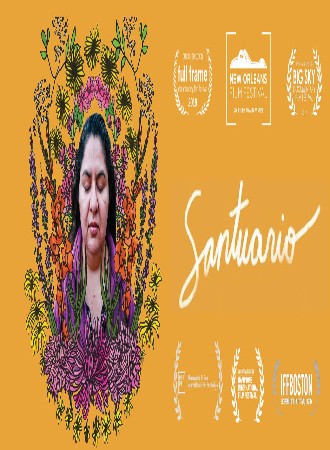
Santuario 2018
Distributed by Collective Eye Films, 1315 SE 20th Ave. #3, Portland OR 97214; 971-236-2056
Produced by Christine Delp and Pilar Timpane
Directed by Pilar Timpane and Christine Delp
Streaming, 26 mins
High School - General Adult
Activism, Family Relations, immigration, Religion
Date Entered: 05/29/2020
Reviewed by Rachael Dreyer, Head of Research Services for Special Collections, Pennsylvania State UniversityFilmmakers Pilar Timpane & Christine Delp portray the reality of current U.S. immigration policy through the lens of one woman’s experience in Santuario. After living in the United States for decades, in 2017, Juana Luz Tobar Ortega received deportation orders from Immigration and Customs Enforcement. She became the first person to seek sanctuary from deportation at an Episcopal church in Greensboro, N.C. Tobar Ortega spends over two years living in an office in the church, away from her family. Immigration authorities tag her with an ankle monitor, and she is unable to leave the church grounds, or work, or return home to her family. (Note: A search of current news sources yielded no new information on the outcome of her case for this reviewer.) Her husband, children, and grandchildren may visit her during the day, but they return home at night; they live 50 to 60 miles away. The strain and heartache that this separation causes are clearly evident. Tobar Ortega turns to her faith, and while prayer offers comfort and solace, she remains separated from her family with tenuous immigration status. Though the events of this film take place in North Carolina, they could easily unfold within any U.S. community.
The filmmakers deftly show how the decision to seek sanctuary from deportation has affected one family, illustrating the tensions that exist between family members and the stresses that the uncertain outcome places upon everyone involved. Creating a compelling argument for taking action and making a moral stand against unfair and discriminatory immigration policies, regardless of faith or beliefs, Delp and Timpane transform the highly personal into a gripping vignette that tells a larger story unfolding at international scale.
Recommended for high school audiences and above, though it could also provide the basis for weighty, meaningful conversations with mature middle-schoolers; a highly effective film that personalizes the inequity and bias of the current immigration system. With much of the nation currently sheltering in place in their homes, the universality of being unable to leave and move about safely and freely will likely resonate even more fully with viewers.
Awards:
Best Short at New Orleans Film Festival, 2019; Official Selection for Full Frame Film Festival, 2019
Published and licensed under the Creative Commons Attribution 4.0 license. Anyone can use these reviews, so long as they comply with the terms of the license.